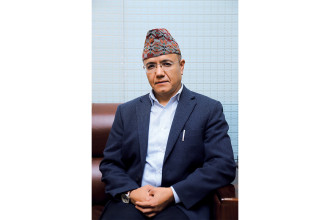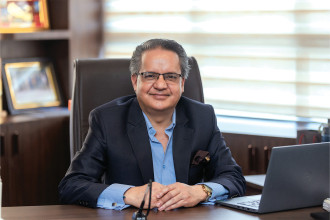
Committed to the vision of building the IT ecosystem in Nepal, Amit Agrawal, the Co-Founder and Director of Khalti Digital Wallet is also a mentor, facilitator, speaker and organiser.
Agrawal believes that technology-driven solutions can simplify life and help in the development of the country. He believes that there are ample opportunities in the country and with the right people and policies in place, Nepal can become a centre of innovation.
Agrawal is also Founder of Janaki Technology (Sparrow SMS), the leading VAS provider in Nepal along with leading the Google Business Group (GBG) community. He was awarded the Entrepreneur ICT Award in 2019.
In this edition of Business 360, we spoke to Agrawal about what leadership means to him. Excerpts:

What’s your definition of a leader?
A leader is someone who can bring the best version of its team members through coaching, nourishing, empathy and gratitude. Leaders lead by example to get things done by its team. Most importantly, leaders are those who can build more leaders and master delegations and escalations within a team.Is leadership in-born or acquired?
I think it’s a blend of both. Few qualities are inherited while most of it depends upon a person’s upbringing and enabling environment. You become an average of the top five persons you hang out the most with.Who comes to your mind as an ideal leader?
My business partner, Manish Modi, is an ideal leader for me.Could you share with us any incident that tested your leadership ability?
There was a situation when we were going through a bad time. Personally also I had a turmoil in my life and at the same time Khalti’s financial situation was bad. Users and business volume was declining too. It was extremely difficult to balance work and personal life and also to keep the brand name alive and the team motivated. It was hard finding investors in Nepal and we were out of cash already. We hustled a lot and by the grace of God and our well-wishers, we were able to raise funds and also upgrade our product and the brand, and we were back in the competition. I think this situation was tough and being in a leadership position in the organisation, it was very challenging for me.
How important is it to have a good team to work with?
It is very important. However, when we join a team, we also become a part of the team. Hence, we are the team and the team will be our reflection only. Hence, if we are not a part of the solution, we are the problem. A good team is built over time through purpose, courage, empathy and gratitude.When should a leader hand over the leadership position?
When they have built a strong leader under them and are confident that the core values, respect and integrity is well cascaded.What changes has the business made after Covid 19?
We learnt a lot of new techniques and the way work is done has changed tremendously. New terms like Work from Home or Zoom Meeting became very common. It helped us grow our Khalti Digital Wallet business as digital payments transformed from a luxury to a need. Covid also helped us realise how important our home and health are.How have your leadership qualities contributed to Khalti or your career?
More than me contributing to Khalti, I think Khalti has contributed to me. I exist because Khalti (or for that matter Sparrow SMS) exists, and that’s my identity. I got to learn a lot from my co-founders, investors and team members.What do you consider your most significant accomplishment as a leader?
Both our products, Sparrow SMS as well as Khalti have made life easy for millions of Nepalis and are recognised brands throughout the nation. At the same time, we have been able to empower a lot of girls through our Smart Chhori Programme. We have been able to create jobs for 70,000 Khalti Agents and 300+ team members. We had many ups and downs and many challenging situations. However, our team never stopped believing and today, we serve more than three million Nepali people. These are our accomplishments, as a team.How can a leader prepare for the unknown?
We should not fear the unknown. However, we should always empower our team and build their skills. We should promote innovation and a culture of open sharing. We must learn from our past mistakes and have faith in ourselves no matter how difficult the time may be. It will pass if we stand still, firm and strong as a team. READ ALSO:
Published Date: March 3, 2023, 12:00 am
Post Comment
E-Magazine
RELATED Leadership





-(1)-1752214965.jpg)